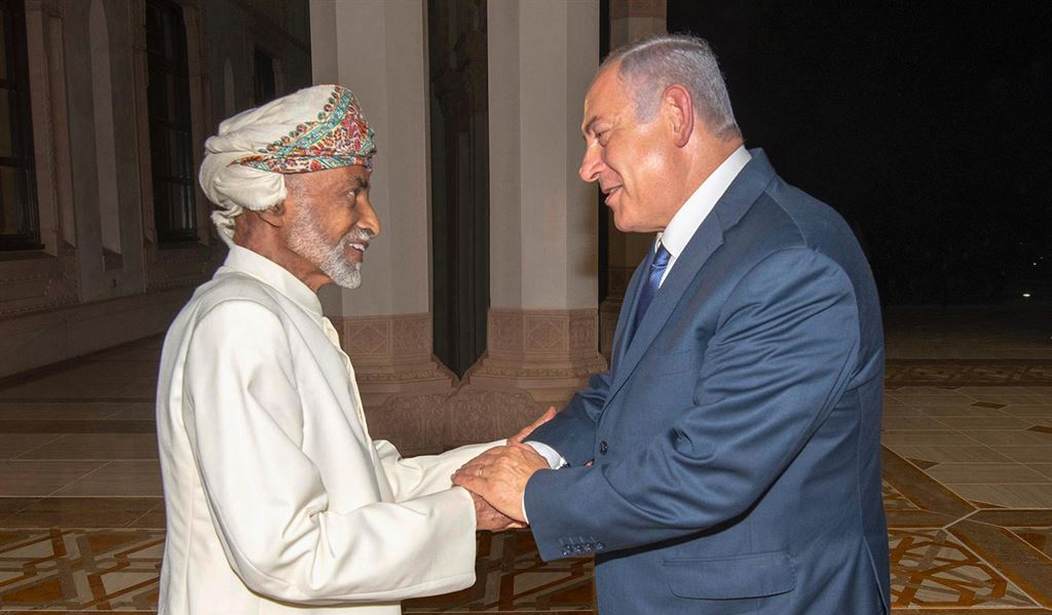The “last decade,” notes James Sinkinson in a perceptive article, has seen a “sea change” in Israel’s ties with “key Arab states.”
And that last decade is also the one in which Benjamin Netanyahu (again, after a stint in the 1990s) has been Israel’s prime minister — specifically since March 2009.
True, conditions for enhanced Arab-Israeli ties have been propitious — particularly the behavior of regional bully Iran, a common enemy; the Obama administration’s courting of Iran and signing of a nuclear deal with it that scared the wits out of both Israelis and Arabs; and the Trump administration’s ambivalence about the U.S. role in the Middle East. Sunni radicalism in the form of ISIS, the Muslim Brotherhood, and others is another common enemy of Israel and Arab states.
Added to that are Israel’s ever-intensifying military activity against Iran, particularly in Syria, which Arab governments watch with approval, along with Israel’s dramatically growing military, economic, technological, and diplomatic clout in general, to the point that in 2019 US News and World Report ranked it — despite how tiny it is — the world’s eighth most powerful country.
But ripe conditions are one thing; the ability to convert them into results is another. And the repeatedly reelected Netanyahu is little less than a diplomatic genius, under whose tenure Israel’s ties have surged not only with Arab states but also with India, China, Russia, as well as East European, African, and South American countries — basically in every niche of the world.
In the Arab sphere, as Sinkinson notes, “Israel’s cooperation and communication with the leadership of eight…nations — the UAE, Saudi Arabia, Egypt, Jordan, Oman, Morocco, Bahrain, and Sudan — is greater than ever.”
Those ties reached a new peak last week when Netanyahu announced that Israel and the UAE were launching “a new cooperative effort” against COVID-19 resulting from “extensive and intensive contacts in recent months.”
Openly cooperating in fighting COVID-19 may seem a simple, rational step to take. But it assumes a different significance in light of the long history of Arab enmity toward Israel.
From 1948 to 1973, that enmity sparked five Arab-Israeli wars, some of them aimed at exterminating the reborn Jewish state. By the first half of the 2000s, it was still driving Arab governments to funnel aid to the then-raging Palestinian terror war against Israel.
That terror war, in turn, was an outcome of an earlier effort to forge peace between Israel and the Arabs — an effort now known as the Oslo process. Led by the Israeli left, with accolades from the Clinton administration and others, it resulted in thousands of dead and wounded on both sides and the emergence of two deeply problematic entities — Hamas-led Gaza and the Fatah-led Palestinian Authority — on Israel’s flanks.
Compared to that failure, Netanyahu’s gradual, realistic, mostly behind-the-scenes work in developing Arab-Israeli ties is a shining success. If, despite all that, he lacks the image of a peacemaker, the reasons are not hard to find.
On the Israeli left — a shrinking contingent still heavily overrepresented in Israeli media and academia — a demonization of Netanyahu that began in the 1990s prevails. Incapable of rational assessment and essentially uninterested in it, the Israeli chattering classes cast him as a dark, retrograde force no matter what he actually does.
And that view holds sway in the worldwide mainstream media as well. For them, it’s enough to know that Netanyahu is on the right-hand side of the Israeli political map to portray him as a “hard-liner” with no positive contribution to make.
It’s not, of course, that Netanyahu has created Shangri-La in the Middle East — nor tried to or thought it was possible. Hatred of Israel and Jews is still dominant — though less and less monolithic — in Arab countries, including those whose governments are closest to Israel. Netanyahu, though, has wisely based his peace efforts on pragmatism and common interests without aiming too high — unlike the Israeli left in the Oslo era, which believed it was achieving a utopian peace with arch-terrorist Yasser Arafat and his PLO.
Netanyahu, though, can take solace in the fact that the majority of the Israeli population appreciates his peacemaking and other accomplishments and — according to all polls at present — would resoundingly elect him yet again if elections were held tomorrow. Eventually the historians, too, will catch up with the truth.
P. David Hornik, a longtime American immigrant in Israel, is a freelance writer, translator, and copyeditor living in Beersheva. In addition to PJ Media his work has appeared in FrontPage Magazine, National Review, New English Review, American Spectator, American Thinker, The Times of Israel, the Jerusalem Post, and elsewhere. Among his books are Choosing Life in Israel and the novel Beside the Still Waters, which was published by Adelaide Books in 2019.
To ‘Annex’ West Bank Land or Not to ‘Annex’: The Hour Draws Near









Join the conversation as a VIP Member